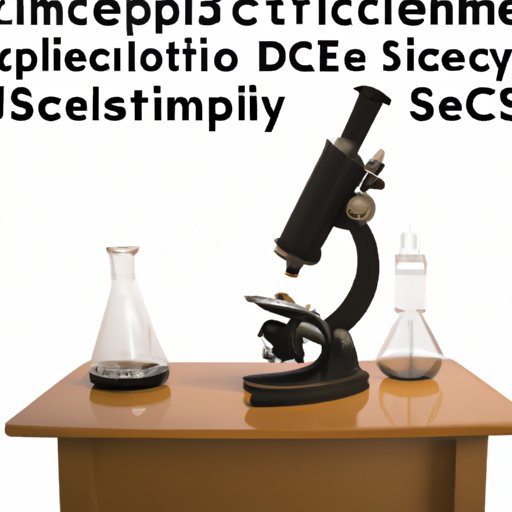Introduction
Skepticism is an important part of scientific inquiry, but what exactly does it mean to be a skeptic in science? In its simplest form, skepticism in science is the questioning of accepted theories or ideas in order to uncover potential flaws or inaccuracies. This article will explore the role of skepticism in scientific inquiry, examining both the positives and negatives of adopting a skeptical attitude in research.
A History of Skepticism in Science: Examining the Evolution of Doubt and Disbelief
The practice of skepticism in science dates back to ancient times, when philosophers such as Aristotle and Plato used doubt and disbelief to challenge existing knowledge and push forward their own ideas. This tradition has continued to this day, with scientists around the world engaging in debates, experiments, and discussions to test and refine their hypotheses.
In recent years, skepticism has become more commonplace in science due to the proliferation of technology and the ease of access to information. With the internet, anyone can now search for and find scientific studies that may contradict or challenge existing theories. This has led to an increase in the number of skeptics in science, who are eager to question accepted ideas and advance their own theories.

Understanding the Role of Skepticism in Scientific Inquiry
Skepticism plays a vital role in the scientific process, as it helps to ensure accuracy and reliability in the results of experiments. By questioning and challenging accepted theories, skeptics can help to uncover errors or inconsistencies in data that might otherwise go unnoticed. This can help scientists reach more accurate conclusions and develop more reliable theories.
At the same time, skepticism is also an important part of the scientific method, which is the set of steps used by scientists to conduct research and draw conclusions. As part of the scientific method, scientists must observe, measure, and analyze data, and then form hypotheses based on their findings. The process of forming hypotheses requires a certain level of skepticism, as scientists must consider all possible outcomes before making any assumptions.
Exploring the Pros and Cons of a Skeptical Attitude in Science
Having a healthy level of skepticism in science can be beneficial, as it helps to ensure accuracy and prevent mistakes from occurring. However, overly skeptical thinking can have its drawbacks, as it can lead to a lack of progress and prevent scientists from reaching their full potential. It is important to strike a balance between being too skeptical and not skeptical enough.

Examining the Benefits of Healthy Skepticism in Scientific Research
One of the major benefits of having a healthy level of skepticism in scientific research is that it can help to enhance the accuracy of scientific findings. By questioning accepted theories and challenging existing data, skeptics can help to uncover errors or inconsistencies that may have gone unnoticed. As a result, scientists can reach more accurate conclusions and develop better theories.
Another benefit of healthy skepticism is that it can help to increase the efficiency of experiments. By questioning and testing hypotheses, skeptics can help to identify areas where further research needs to be done, saving time and resources in the long run.

The Impact of Skepticism on Scientific Progress
Skepticism can have a positive impact on scientific progress, as it encourages critical thinking and facilitates new discoveries. By questioning accepted theories, skeptics can help to uncover new insights and open up possibilities for further exploration. This can lead to new breakthroughs and innovations in science.
Investigating How Skepticism Can Lead to New Discoveries
One way that skepticism can lead to new discoveries is by challenging assumptions. By asking questions and looking at things from different angles, skeptics can uncover hidden truths and uncover new solutions to problems. This can lead to unexpected breakthroughs and advances in scientific understanding.
Another way that skepticism can lead to new discoveries is by generating creative solutions. By questioning accepted theories and pushing boundaries, skeptics can come up with unique approaches to problems that may not have been considered before. This can lead to new ideas and innovative solutions that can revolutionize scientific research.

Debating the Place of Skepticism in Science Education
When it comes to teaching students about science, there is some debate over the place of skepticism in the classroom. Some argue that teaching students to be open-minded and accept new ideas without proof or questioning is important, while others believe that emphasizing the value of a skeptical mindset is equally important. Ultimately, it is up to educators to decide what approach works best for their students.
On one hand, teaching students to be open-minded can help to foster creativity and encourage exploration. On the other hand, teaching students the value of skepticism can help them to think critically and make informed decisions. It is important for educators to find a balance between teaching students to be open-minded and teaching them to be skeptical.
Conclusion
Skepticism is an important part of scientific inquiry, as it helps to ensure accuracy and reliability in the results of experiments. It also encourages critical thinking and facilitates new discoveries, helping to push the boundaries of scientific understanding. While there are pros and cons to having a skeptical attitude in science, it is clear that skepticism can play an important role in the advancement of knowledge.
In conclusion, skepticism is an important part of scientific inquiry, and it is important for educators to find a balance between teaching students to be open-minded and teaching them to be skeptical. By striking this balance, students can learn to think critically and make informed decisions, leading to more accurate and reliable results in scientific research.
(Note: Is this article not meeting your expectations? Do you have knowledge or insights to share? Unlock new opportunities and expand your reach by joining our authors team. Click Registration to join us and share your expertise with our readers.)
